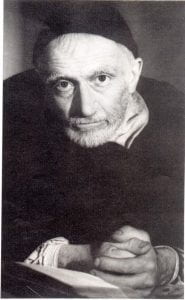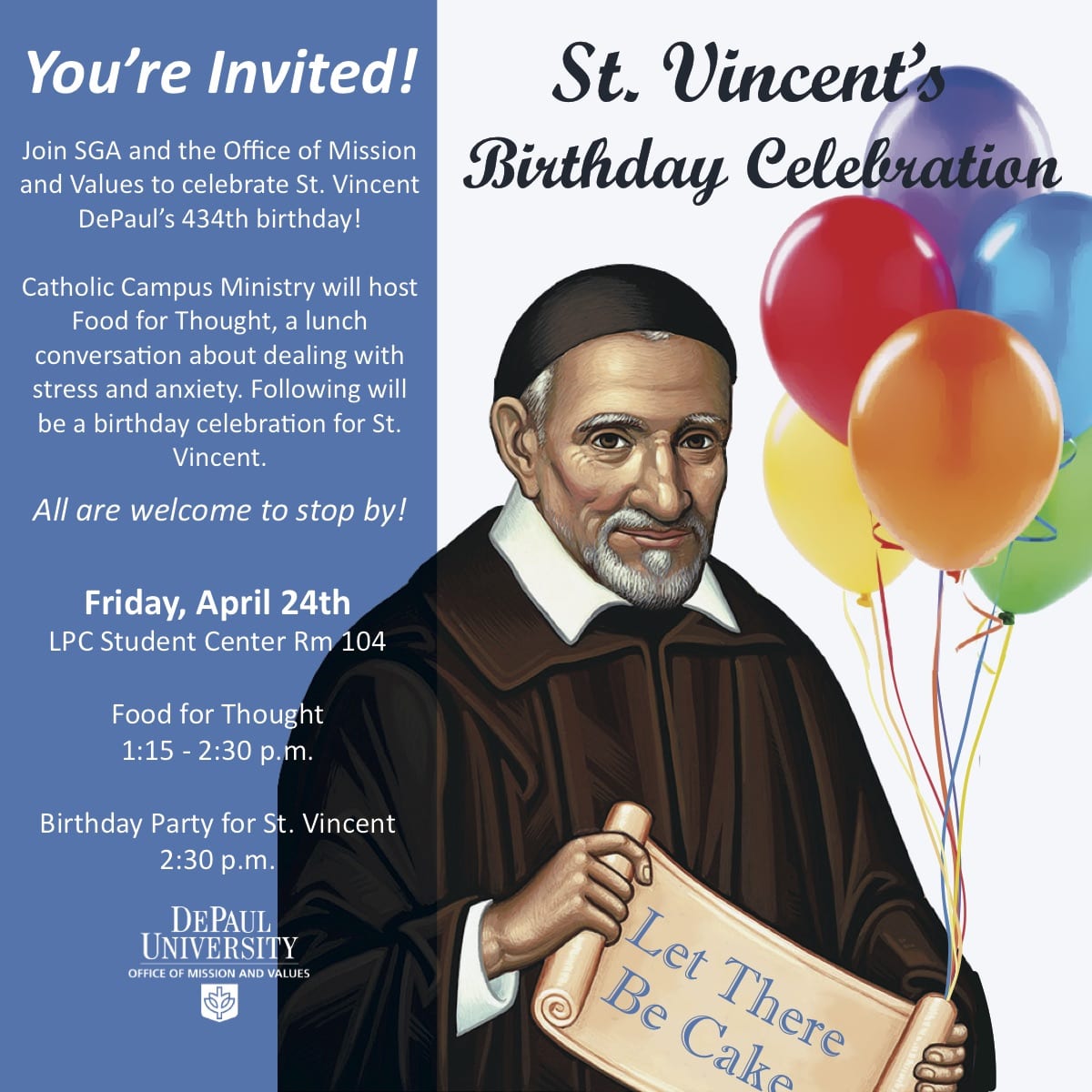Written By: Miranda Lukatch, Editor, Vincentian Studies Institute
 What do Vincent de Paul, Louise de Marillac, Elizabeth Seton, and Frédéric Ozanam have in common? Some answers are obvious: they loved God deeply, they shared a mission, and they accomplished enormous good for the poor. But they shared commonalities not only in what they did but how they did it. All these dynamic Vincentian figures relied on the power of friendship. This could take a practical form, such as networking to found and support their organizations. But they also relied on it to fulfill personal needs—to mature their outlooks and nurture the incredible amount of spirit it took to accomplish their goals. Much of what we know about these figures comes from the letters they wrote, and, especially in Elizabeth’s and Frédéric’s cases, many of these were to their friends. [1] Therefore, it seems fitting that before Valentine’s Day, which many countries now celebrate as a friendship day, we consider the role of friendship in our Vincentian heritage, our DePaul community, and in our own daily lives.
What do Vincent de Paul, Louise de Marillac, Elizabeth Seton, and Frédéric Ozanam have in common? Some answers are obvious: they loved God deeply, they shared a mission, and they accomplished enormous good for the poor. But they shared commonalities not only in what they did but how they did it. All these dynamic Vincentian figures relied on the power of friendship. This could take a practical form, such as networking to found and support their organizations. But they also relied on it to fulfill personal needs—to mature their outlooks and nurture the incredible amount of spirit it took to accomplish their goals. Much of what we know about these figures comes from the letters they wrote, and, especially in Elizabeth’s and Frédéric’s cases, many of these were to their friends. [1] Therefore, it seems fitting that before Valentine’s Day, which many countries now celebrate as a friendship day, we consider the role of friendship in our Vincentian heritage, our DePaul community, and in our own daily lives.
Let’s put the importance of friendship within our own cultural context—both in broader American culture and in the culture that exists at DePaul. Back in 2023, the US surgeon general made headlines when he declared loneliness a public health epidemic. In early 2024, a poll from the American Psychiatric Association found that “30% of adults [said] they have experienced feelings of loneliness at least once a week over the past year, while 10% [said] they are lonely every day. Younger people were more likely to experience these feelings, with 30% of Americans aged 18–34 saying they were lonely every day or several times a week.” [2] Considering the student population DePaul serves, these are essential statistics. A significant benefit of being a college graduate is an increased likelihood of having more friends, which provides cascading advantages over a lifetime. [3] This is a benefit we hope our students will derive from their time in our community. But forming and maintaining friendships in adulthood is so difficult that a specific branch of therapy, friendship therapy, has recently been created to address this need. Whole books are being written on how to make friendships work, and the New York Times even has a “friendship correspondent.” (That’s Anna Goldfarb, who has written an excellent book called Modern Friendship.)
Given the importance and difficulty of cultivating friendships, what can we learn from the Vincentian figures who excelled at this? They teach us that we should accept difficulty; just because their friendships were powerful doesn’t mean that they were easy to develop or maintain. When Louise first met Vincent, she felt accepting him as her spiritual director would be “repugnant.” Vincent did not want to be anyone’s director, and a curious two-year gap in an otherwise voluminous correspondence between them has led more than one scholar to believe there was a period of “coolness” in their relationship. [4] I highly recommend reading the published collections of the letters of the four Vincentian personages, which DePaul has made available online. [5] They show how affection within their relationships grew. There are two major threads running through all of them. First, these friendships were grounded not just in common interests but in a deep and common love (of God and of the poor) that was carried out in common enterprises. Second, the letters are supreme demonstrations of simplicity. Simplicity in the Vincentian sense usually means cultivating a deep sincerity, expressing a total alignment of our values, words, and behavior. But I think it could be extended to mean something else: profound openness about thoughts and feelings, in the sense of our internal states, in the sense of our affections, and in the sense of accepting the thoughts and feelings of others. Author and scholar Brené Brown has observed that the word courage “originally meant ‘to speak one’s mind by telling all one’s heart.’” [6] This is what we see happening in the lives and letters of our Vincentian forebears. They had the courage to practice simplicity.
So, Vincentian wisdom shows us that the best friendships are based on shared values and what might be called applied simplicity. We at DePaul have a particularly promising chance to strengthen relationships with those around us based on this wisdom. We are a community “gathered together for the sake of a mission,” so we know it is likely that others here share at least some of our deepest values. And if we practice simplicity, if we have the courage to make first moves and to be (appropriately) persistent, if we are open about what is in our hearts, then in time we can build the same types of friendships that sustained our Vincentian exemplars.
Reflection Questions:
- Who are the people who seem the likeliest partners in friendships for you? Are these people you need to reach out to, or are they people you already know? Where are the existing opportunities to deepen these relationships, and what are some ways you can create more?
- How have your friendships with colleagues at DePaul inspired and nurtured you? Is there anything you would like to accomplish as a joint effort with your friends?
Reflection by: Miranda Lukatch, Editor, Vincentian Studies Institute
[1] Numerous articles have been written on the role of friendship in these Vincentians’ lives. In addition to those cited in other footnotes in this article, some of the best are Margaret J. Kelly, D.C., “The Relationship of Saint Vincent and Saint Louise from Her Perspective,” Vincentian Heritage 11:1 (1990): 77–114. Available at: https://via.library.depaul.edu/vhj/vol11/iss1/6; Wendy M. Wright, “Elizabeth Ann Bayley Seton and the Art of Embodied Presence,” Vincentian Heritage 18:2 (1997): 249–60. Available at: https://via.library.depaul.edu/vhj/vol18/iss2/9; Judith Metz, S.C., “The Key Role of Friendship in the Life of Elizabeth Bayley Seton,” Vincentian Heritage 29:1 (2009): 8–23. Available at: https://via.library.depaul.edu/vhj/vol29/iss1/2; and Frederick J. Easterly, C.M., “Frédérick Ozanam, A Layman For Now,” Vincentian Heritage 4:2 (1983): 140–71. Available at: https://via.library.depaul.edu/vhj/vol4/iss2/4. If you visit Vincentian Heritage’s website at https://via.library.depaul.edu/vhj/, use “friend” as a search term to get results for many more.
[2] American Psychiatric Association, “New APA Poll: One in Three Americans Feels Lonely Every Week,” January 30, 2024, https://www.psychiatry.org/news-room/news-releases/new-apa-poll-one-in-three-americans-feels-lonely-e.
[3] Daniel A. Cox, “The College Connection: The Education Divide in American Social and Community Life,” Survey Center on American Life, December 13, 2021, https://www.americansurveycenter.org/research/the-college-connection-the-education-divide-in-american-social-and-community-life/.
[4] There’s some ambiguity about whether Louise mentions this repugnance specifically about Vincent as a person or just about changing directors in general. Louise de Marillac, document A.2, “Light,” n.d., Spiritual Writings, 1. Available online at: https://via.library.depaul.edu/ldm/; Hugh O’Donnell, C.M., “The Relationship of Saint Vincent and Saint Louise from His Perspective: A Personal and Theological Inquiry,” Vincentian Heritage 11:1 (1990): 62. Available at: https://via.library.depaul.edu/vhj/vol11/iss1/5; Loretto Gettemeir, D.C., “Louise: A Life in Her Own Words,” Vincentian Heritage 12:2 (1991): 111. Available at: https://via.library.depaul.edu/vhj/vol12/iss2/2/; see also O’Donnell, “Relationship of Saint Vincent and Saint Louise from His Perspective,” 69.
[5] For Vincent’s letters, see: https://via.library.depaul.edu/coste_en/. For Louise’s, see: https://via.library.depaul.edu/ldmlcd/. For Elizabeth’s, see: https://via.library.depaul.edu/seton_lcd/, and for Frédéric’s, see: https://via.library.depaul.edu/ozanam_law/.
[6] Brené Brown, The Gifts of Imperfection: Let Go of Who You Think You’re Supposed to Be and Embrace Who You Are (Hazelden, 2010), 12.






